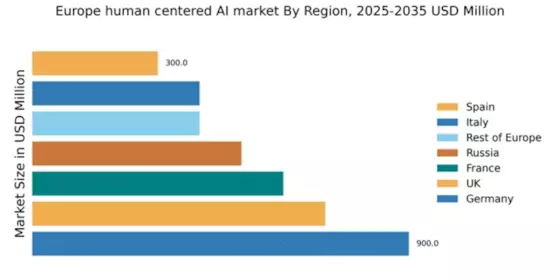Germany : Strong Infrastructure and Innovation Hub
Germany holds a commanding market share of 30% in the human-centered AI sector, valued at $900.0 million. Key growth drivers include robust industrial automation, significant investments in R&D, and a strong focus on ethical AI practices. Demand is driven by sectors like automotive and manufacturing, supported by government initiatives promoting digital transformation. Regulatory frameworks are evolving to ensure compliance with data protection laws, fostering a secure environment for AI deployment.
UK : Thriving Tech Ecosystem and Talent Pool
The UK commands a 23% market share in the human-centered AI market, valued at $700.0 million. Growth is fueled by a vibrant tech ecosystem, particularly in London, where fintech and AI startups thrive. Demand is increasing in sectors like healthcare and finance, driven by the need for data-driven decision-making. Government initiatives, such as the AI Sector Deal, aim to enhance the UK's global competitiveness in AI while ensuring ethical standards are met.
France : Strong Government Support and Investment
France captures 20% of the human-centered AI market, valued at $600.0 million. Key growth drivers include government-backed initiatives like the AI for Humanity strategy, which promotes AI research and development. Demand is particularly strong in sectors such as transportation and healthcare, where AI applications are rapidly expanding. The regulatory landscape is supportive, with policies aimed at fostering innovation while ensuring data privacy and security.
Russia : Government Initiatives and Investment Focus
Russia holds a 17% market share in the human-centered AI sector, valued at $500.0 million. Growth is driven by government initiatives aimed at boosting technological advancements and digital transformation across industries. Key demand trends are emerging in sectors like defense and telecommunications, where AI applications are gaining traction. The competitive landscape is evolving, with local players gaining ground alongside international giants, supported by favorable regulatory policies.
Italy : Focus on Industrial Automation
Italy accounts for 13% of the human-centered AI market, valued at $400.0 million. The growth is primarily driven by the manufacturing sector's push for automation and efficiency. Demand is increasing for AI solutions that enhance production processes and supply chain management. Government initiatives, such as the National Industry 4.0 Plan, are fostering innovation and investment in AI technologies, creating a conducive environment for growth.
Spain : Government Support and Digitalization Efforts
Spain holds a 10% market share in the human-centered AI market, valued at $300.0 million. Growth is driven by the integration of AI in public services and healthcare, supported by government initiatives aimed at digital transformation. Demand is increasing for AI solutions that improve service delivery and operational efficiency. The competitive landscape includes both local startups and international players, with a focus on collaboration and innovation.
Rest of Europe : Varied Applications Across Industries
The Rest of Europe captures a 13% market share in the human-centered AI sector, valued at $400.0 million. Growth is driven by diverse applications across industries, including agriculture, logistics, and retail. Demand trends indicate a rising interest in AI solutions that enhance operational efficiency and customer engagement. The competitive landscape is characterized by a mix of local and international players, with varying regulatory environments influencing market dynamics.

















